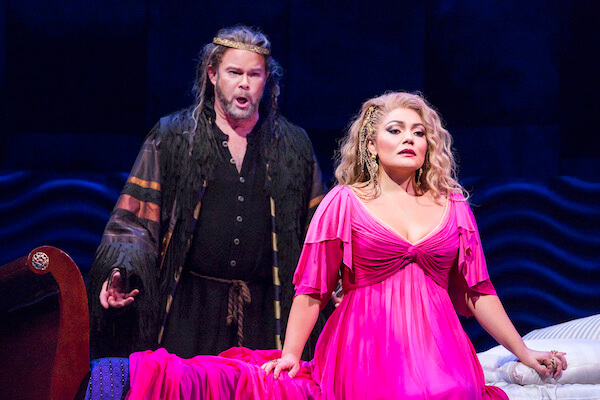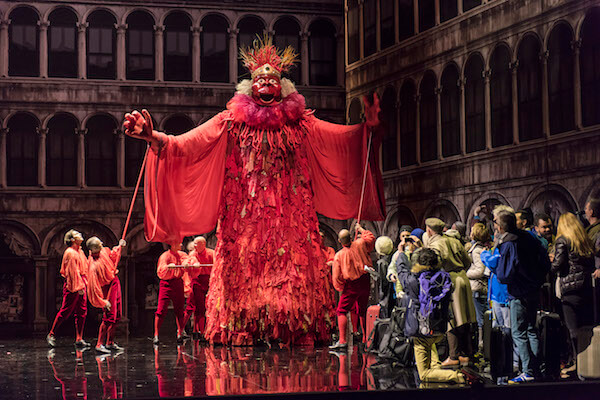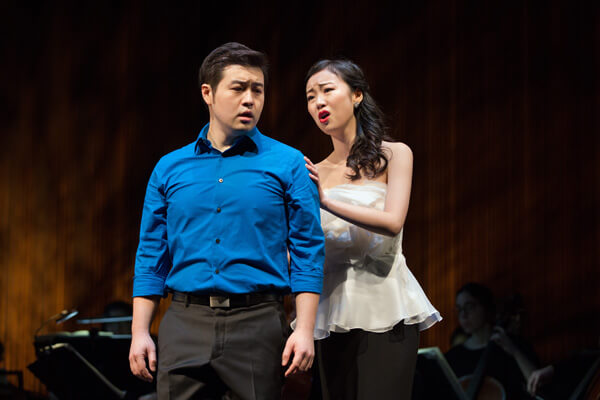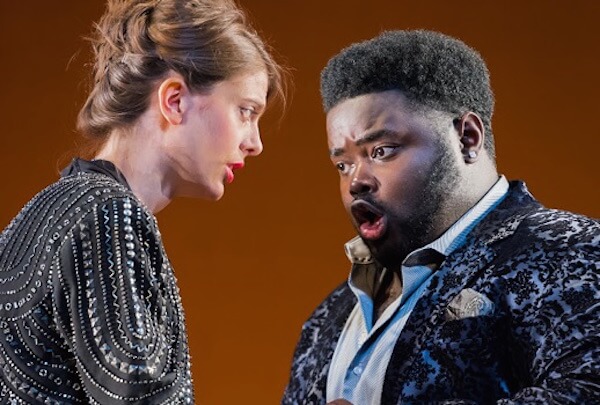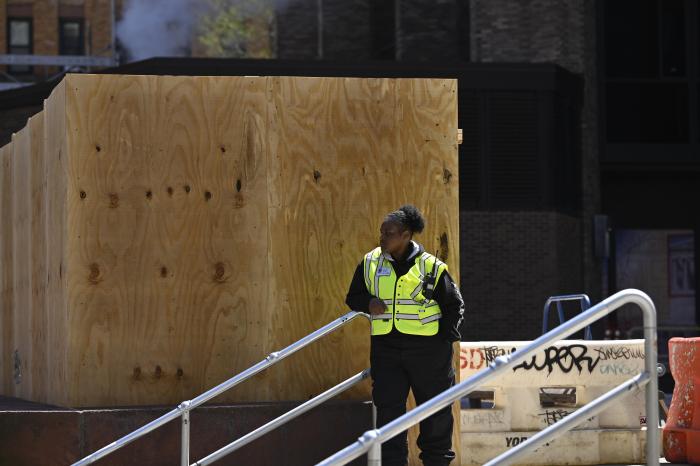Nina Stemme as Brünnhilde in “Die Walküre.” | CORY WEAVER/ SAN FRANCISCO OPERA
Last month, Washington National Opera finally mounted three complete “Ring” cycles in the compelling, image-rich production by Francesca Zambello that began in 2006. WNO ran out of funds in 2008’s crash and so “Götterdämmerung” got seen first at San Francisco Opera, the project’s co-sponsor. The whole company, onstage and off, and the orchestra took a much-deserved curtain call after the final show May 22: it’s a great achievement. Dramatically and emotionally, this “Ring” outstripped the Met’s Robert Lepage train wreck by miles.
Zambello has tweaked things and altered emphases, mainly for the good — though I missed the specificity of starting the cycle at Gold Rush Sutter’s Fort. The show jumps forward through decades and loci of North American experience, embracing the ‘20s boom, a “Duck Dynasty”/ NRA ethos, deteriorating highways, despoiled oil fields and denuded forests, and a soulless corporate HQ. The emphases are two: environmental and familial. The male power struggle among the forces of gods, giants, and dwarves wreaks havoc on the physical world and on the women characters. At the end we witnessed Brünnhilde bonding with Gutrune, the Rhinemaidens, and the female chorus, essentially cleaning up the mess. A final image of a young girl planting a seedling risked kitsch but also seemed right, in the moment.
Conductor Philippe Auguin got — and lingered in — hero’s welcomes before and after every act. I was a bit skeptical, though he does have the WNO orchestra playing far above their wonted standard — with the exception of the brass section, slurring entries and pitches all four days. Auguin’s achievement in clarity sometimes came at a cost to the sense of overall architecture — until “Götterdämmerung,” which he brought off most excitingly.
The “Ring” spins in Washington, Manhattan
The defining stars of this traversal’s cast were four. We enjoyed one of the world’s greatest Brünnhildes and greatest Wotans in Nina Stemme (making her company debut in this cycle) and Alan Held. The Swedish soprano was in really sovereign form, with billowing phrases, spectacular top notes, and commitment; the American heldenbaritone just cleaned up, not always “pretty pretty“ tonally but a master of breath control, dynamics, and charged stage deportment. Together they brought home the enormity and depth of the father and daughter’s mutual love and need; many tears flowed.
“Rheingold” got a jolt of gorgeous tone, pointed verbal phrasing, and stage savvy from William Burden’s Loge, a new assignment triumphantly brought off. Eric Halfvarson, at 67 a very experienced Hagen and in really strong voice, gave a similar charge to his every utterance and gesture in “Götterdämmerung.”
Alan Held as Wotan. | SCOTT SUCHMAN/ WASHINGTON NATIONAL OPERA
Strong casting prevailed. Elizabeth Bishop’s stalwart Fricka — particularly sharply drawn in “Walküre” — and Gordon Hawkins’ lively if somewhat soft-grained Alberich remain pillars of this staging. Jamie Barton made a phenomenal Second Norn and was almost as good as Waltraute: what an instrument! Bass-baritone Ryan McKinny sounded restored to promising form as Donner. He and the bright-voiced Melissa Citro (Virginia Opera’s fine 2011 Sieglinde) really made something — under Zambello’s direction — of the tough, unrewarding parts of Gunther and Gutrune. Both looking sensational, they were unafraid to appear foolish and weak; Citro’s transformation from manipulated bimbo to compassionate witness for truth proved very moving.
As befits a good Second Generation Feminist “Ring,” the teams of Rhinemaidens, Walküres, and Norns were cast from notable strength. Daniel Brenna — pretty much a total wash in the Met’s ‘Lulu” — here had the benefit of a genuine director and came through his superhuman assignment reasonably well. His tenor is neither beautiful nor memorable, but it has stamina and impact. “Siegfried” witnessed too many shouted high notes and no poetry (though such tenors as René Kollo and Siegfried Jerusalem have found it); but he did considerably better in “Götterdämmerung”.
David Cangelosi, an expert Mime as to pitch and diction, needed reining in: too much “public pet” hamming. The only relative disappointments were Richard Cox’s inert Froh and Meagan Miller’s Sieglinde. A few good high notes confirmed Miller’s Straussian potential, but the role lies chiefly in the middle, which was ropy and heavily vibratoed. This left a hole in “Walküre” that Stemme and Held’s utterly wrenching performance of the final scenes overcame.
A “Ring” cycle is an event; I ran unexpectedly into friends from New York, Massachusetts, Michigan, and California. DC realities impinged (Newt Gingrich at “Rheingold,” maybe identifying with Alberich?) and impressed (Ruth Bader Ginsburg made the scene at “Götterdämmerung”).
Between “Walküre” on May 19 and “Siegfried” two days later, I happily heard something completely different: a very impressive recital at the Phillips Collection by Vanessa Vasquez, an excellent full lyric soprano still at Philadelphia’s Academy of Vocal Arts. The admirable DC Vocal Arts series runs these Phillips concerts in which the artists choose works of art from the museum’s superb collection that — projected on a screen — amplify or dialogue with the songs. Vasquez’s choices showed the same sensitivity as did her long-breathed phrasing and verbal acuity. Working with the always on-point pianist Danielle Orlando, she delivered a varied, balanced program with admirable vocal and linguistic detail. Her English enunciation was outstanding in songs by Rebecca Clarke and three fine numbers (two lyrical, one satirical) by Ben Moore.
Spanish selections (including Obradors’ enchanting “Del cabello más sutil”) were equally specific, as were three Lieder by Richard Strauss, including a deeply moving “Befreit.” Her Russian prep at AVA has yielded results, but still needs fine-tuning: she tended to make every “eh” a “yeh,” for example. But both Rachmaninov’s “Spring Waters” and Tchaikovsky’s harrowing “Was I a Blade of Grass?” showed her lovely, swelling timbre, dynamic control, and considerable range: a soprano to watch.
Washington may have put New York to shame in terms of its “Ring” production, but it was salutary to hear — as a coda — James Levine’s final, pretty stupendous Met Orchestra concert at Carnegie May 26, with “Ring” excerpts. The orchestra, as tribute to Levine, was pretty much on fire; he occasionally overdrove them, as if they were in a pit, sometimes making Stefan Vinke’s dry heroic tenor hard to hear. Unlike Brenna, Vinke’s best notes are on top.
Meanwhile, Christine Goerke, radiant in expression, was in amazing voice up to prolonged high Cs for the two duets with Siegfried and the Immolation Scene. She has yet to enact the final Brünnhilde on the stage, so her phrasing there was not always as considered as the more experienced Stemme. But she flooded us with beautiful sound. What a privilege to hear the world’s two greatest exponents of this music in the same week!
David Shengold (shengold@yahoo.com) writes about opera for many venues.




























